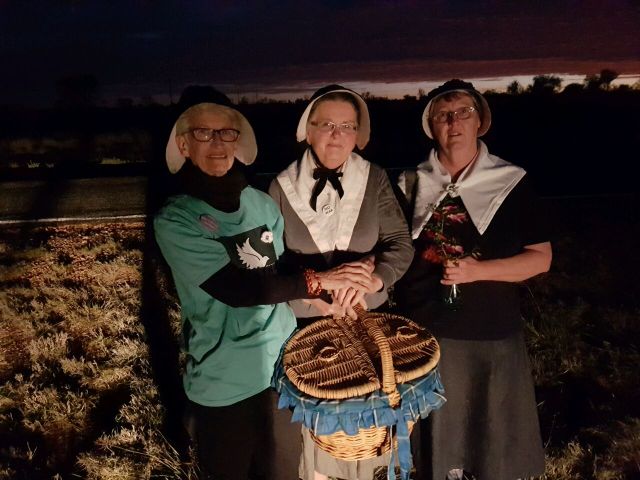
Three “Quaker Grannies for Peace” set up breakfast on the road to Pine Gap on September 26 and invited military personnel arriving for work at the base to sit down with them.
The action is one of a series of events marking the 50th anniversary of the secret US military facility at Pine Gap, by groups advocating for the base’s closure.
Founder of the Quaker Grannies Helen Bayes said: “We are asking Australians whether it is appropriate for a foreign country to be operating a secret facility with no transparency on Australian soil; a base that may well be implicating Australians in wars that our government has not entered into.”
Located half-an-hour's drive south-west of Alice Springs, Pine Gap is one of Australia's most secret sites. It collects various kinds of data from the Asia Pacific and the Middle East, including targeting data for American drone operations and assassinations.
“Our Quaker peace testimony from 1661 says ‘We utterly deny all outward wars and strife and fighting with outward weapons for any end or under any pretence whatsoever’,” said Bayes.
Grandmother of five, Dawn Joyce said: “This is sovereign indigenous land yet the US claim that all their bases are US soil. I support the claim of the Arrernte people who did not agree to this base being placed on their sacred lands.”
Last year the Grannies appeared at the entrance to a military training area at Shoalwater Bay, near Rockhampton, during the largest US/Australian joint military exercise in history.
Professor Richard Tanter from the Nautilus Institute for Security and Sustainability and will be speaking at the Independent and Peaceful Australian Network (IPAN) Conference in Alice Springs from 29 September to 2 October.
"One of Pine Gap's two key functions is as a control station and a downlink station for signal intelligence satellites 36,000 kilometres up in space," he said.
"They are picking up a very wide array of radio transmissions, including cell phones, satellite phones and so forth. And that provides the data, both the contents and the geolocation data for targets of interest to the United States military.”
He said Pine Gap was also used for counter-terrorism and wider intelligence programs and questioned whether: "At a legal and moral level do we really want to be involved in operations which are frankly illegal under international law. In countries where we're not at war, such as Pakistan or Somalia or Yemen, these are simply assassinations.”
He pointed out that from China’s perspective, the US-Australian military alliance is likely to raise the supposition that “Australia is not so much hosting US military bases, but is becoming a virtual American base in its own right”.
Tanter said the site posed a danger to Australia because it would be a "pretty high priority nuclear missile target" in the event of a major conflict between the United States and Russia or China.
"Secondly, it is itself involved in nuclear war planning. I think that's a totally awful thing for us to contemplate — you can't use nuclear weapons except in a fairly genocidal way.”
Anti-militarism advocates at Pine Gap this week will be trying to raise these concerns. They will argue that the time when it was in our strategic interest to have a strong military relationship with the US is over and Australia would be better off with a more independent foreign policy. They will also argue that any decision to go to war should not be the sole decision of the Prime Minister and must be debated in Parliament.
Like the article? Subscribe to Green Left now! You can also like us on Facebook and follow us on Twitter.